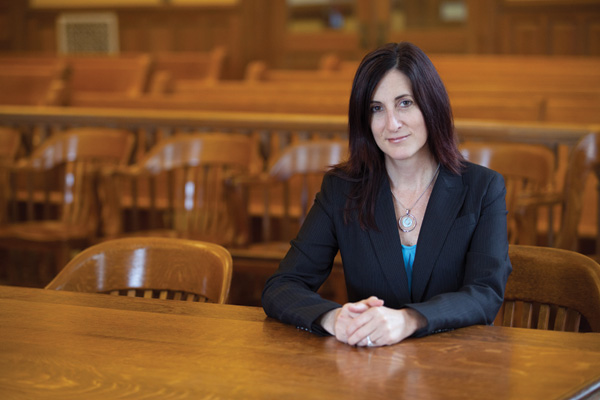Special Victims Unit Prosecutor Breaks New Ground
For nearly two decades, Kristine Decker Hawlk ’91 has been fighting for victims of domestic violence and sexual abuse as a prosecutor in the Dutchess County (New York) District Attorney’s Office. But all those years of experience in the Special Victims Unit don’t make the work any easier. “Just when you think you’ve seen everything, some case comes along that’s even more horrifying,” Hawlk says. “There are days when you come face-to-face with evil.”

Because of the nature of the crimes, Hawlk must form closer bonds with victims than most other prosecutors. And there are times when she has to be creative in how she presents her case to a jury. “You’re not dealing with a simple robbery or burglary,” Hawlk says. “These victims have to get up in front of a roomful of strangers and talk about things that most of us would find difficult to talk about with our closest friends. Most often, the offender is someone who was very close to them.”
In 2010, Hawlk broke new legal ground when she convinced a judge to allow a teenage girl to have a specially trained dog accompany her on the witness stand when she testified against her father. The dog had been used in the girl’s therapy to help her talk about what had happened and to prepare her for the trial. The case was the first ever in New York in which a “comfort dog” was permitted in a courtroom.
Hawlk obtained a conviction, and the verdict withstood an appeal by defense attorneys who contended the dog’s presence had unfairly influenced the jury. Hawlk and others in the District Attorney’s Office are continuing to work with state lawmakers to craft a new law that would set standards and parameters in which the use of such comfort animals would be permitted. Several other states—including Washington, Indiana, Arizona, and Hawaii—already have such a law, and Hawlk says she hopes New York prosecutors will soon be able to use such a technique more regularly to ease the stress on victims.
“There’s no formula—no one-size-fits-all—that I can use to help them prepare to come to court,” Hawlk says. “It’s quite common for them to tell me at the start of a case, ‘I just can’t do this.’ You have to find ways to establish trust, and that’s always challenging.”
Hawlk says she never promises victims she’ll secure a conviction. “I tell them up front that I’ll never lie to them, and I can’t guarantee a guilty verdict. But I do promise I’ll do everything I can to try to keep them safe by holding the offender accountable,” she says.
In one case, a child who had been raped refused to discuss the details of her abuse while Hawlk was looking at her. So, Hawlk sat on the floor with her back to the child as she talked about what had happened.
A native of Dutchess County, Hawlk says she decided at an early age that she wanted to practice law. “I always told my parents I wanted to be a lawyer or a dolphin trainer at SeaWorld,” she says. “They were quite relieved when I chose the former.”
Hawlk graduated from high school in the spring of 1988, and in part because her mother, Mary Decker, was a Vassar employee, she enrolled at the college that fall. “The close relationships you form with the faculty help shape you in ways a bigger school with larger classes can’t,” Hawlk says.
Two faculty members especially influenced her: the late William Rumble, a political science professor who taught her constitutional law class, and sociology professor Diane Harriford, who is still a member of the faculty. “[Rumble] had a way of making the law come alive, and Diane took sociology out of the theoretical and applied it to everyday situations,” Hawlk says.
As difficult as the work is sometimes, Hawlk plans to remain in the Special Victims Unit for the foreseeable future. “When my niece was 12, she asked me, ‘Aunt Tine, if you’re a lawyer, how come you don’t make lots of money?’” she says. “I don’t do this for the money, and I certainly don’t do it for the glory. You don’t always win in court, but taking the victims through the process often helps them come out the other side, so they can begin to heal. I do it to speak up for those whose voices need to be heard.”
